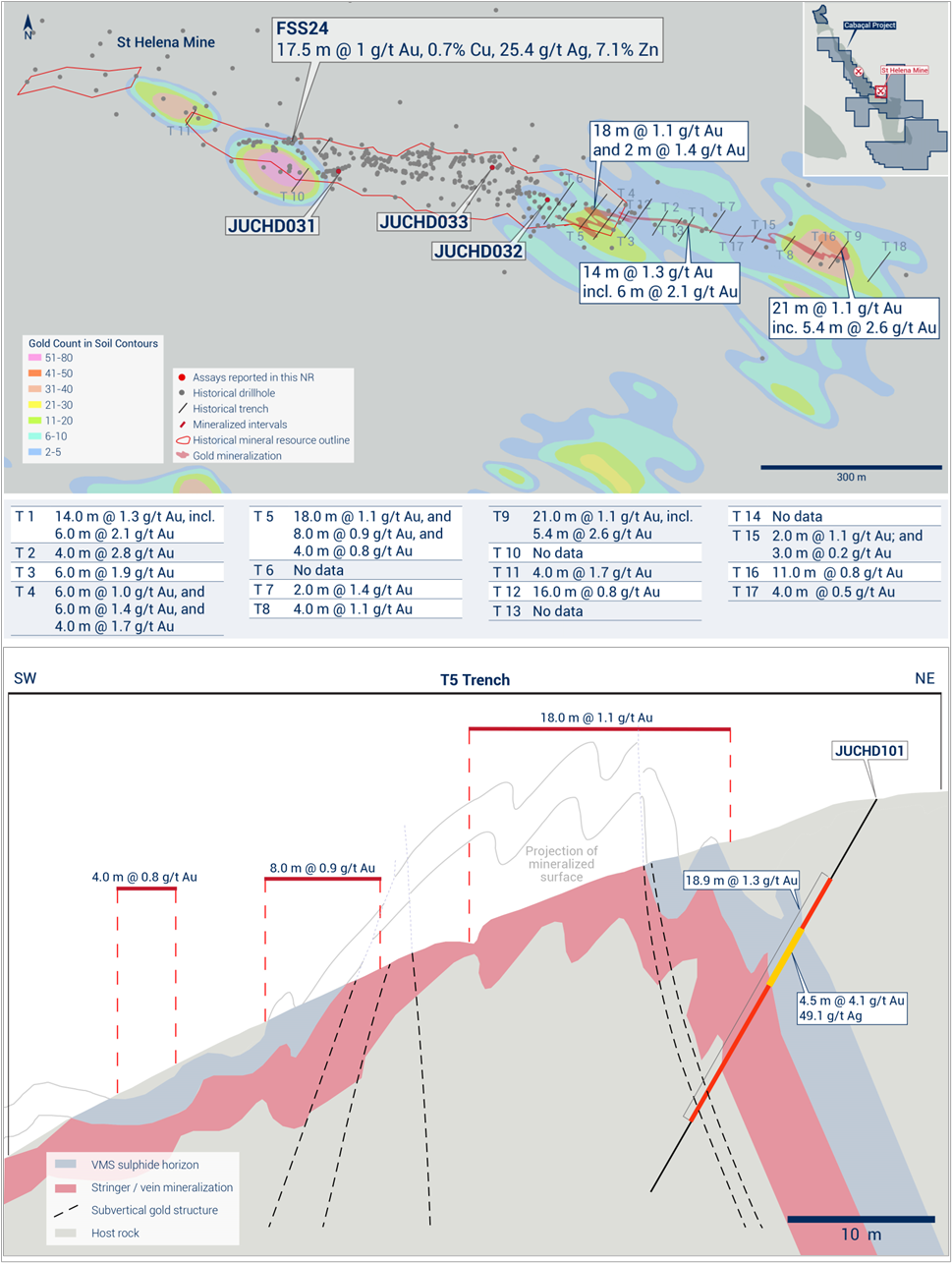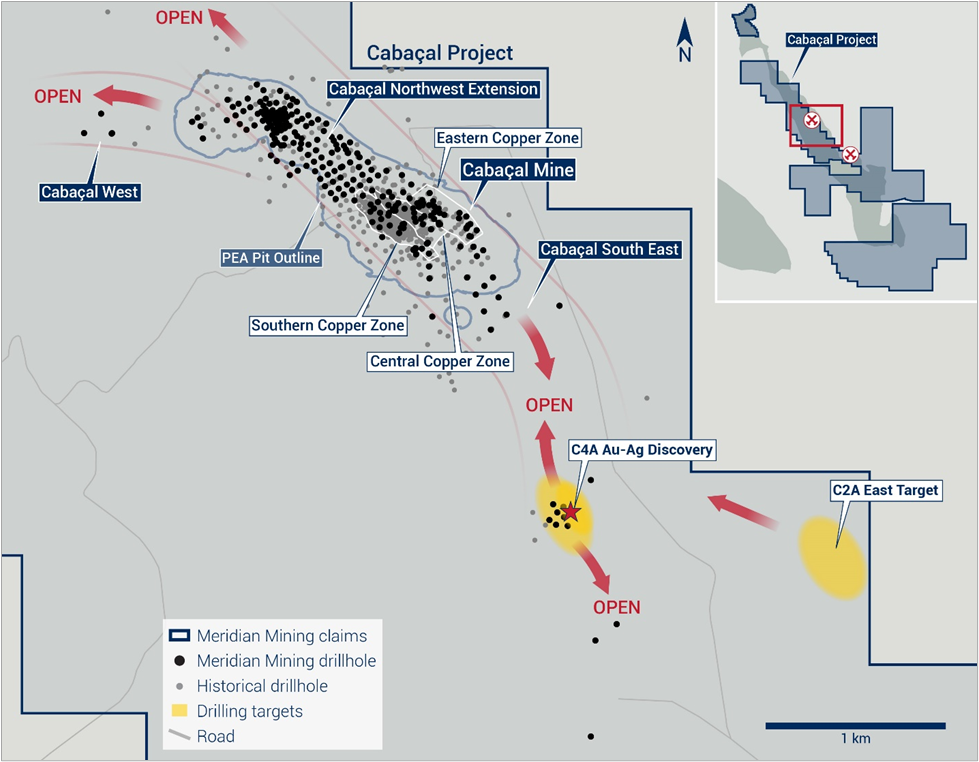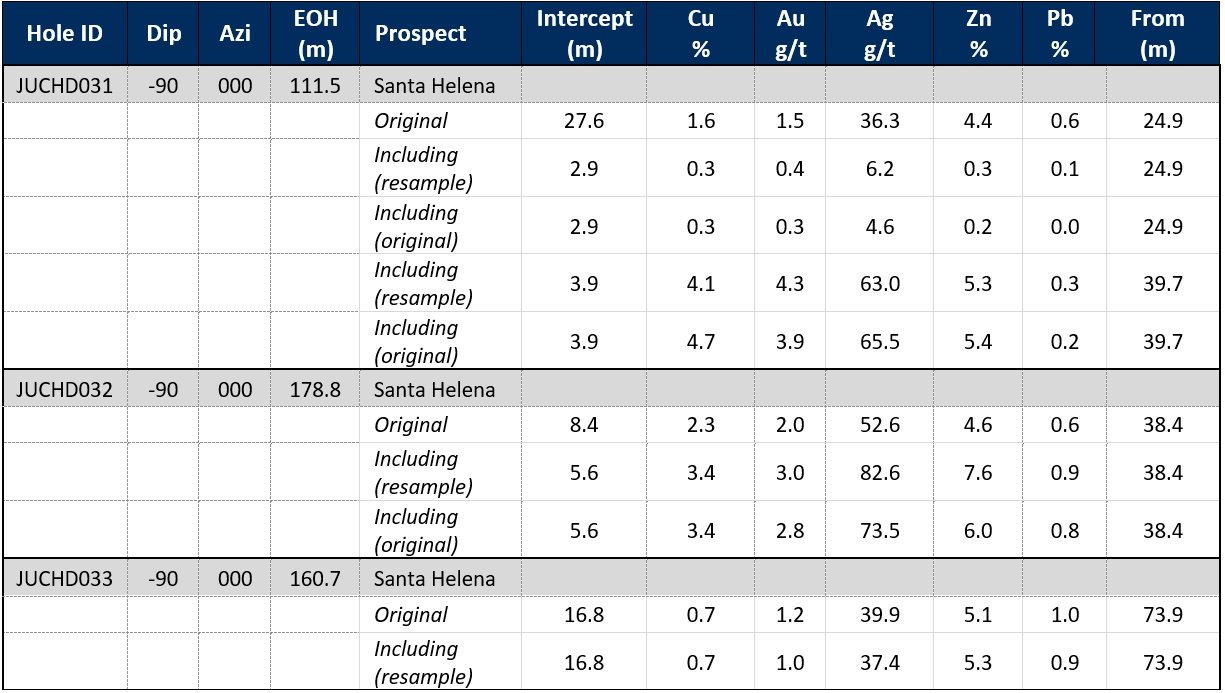from Meridian Mining UK S (isin : GB00BN4LHY20)
Meridian Expands Drill Program to Target New Prospects along the Cabaçal VMS Belt
Re-assaying historic Santa Helena core confirms high-grade Cu-Au-Ag-Zn targets
LONDON, UK / ACCESSWIRE / May 23, 2023 / Meridian Mining UK S (TSX:MNO)(OTCQX:MRRDF)(Frankfurt/Tradegate:2MM) ("Meridian" or the "Company") is pleased to announce upcoming drilling programs at Santa Helena and C2A East copper gold targets in the Cabaçal VMS belt. Recent re-assays of historic drill core confirm high grade Cu-Au-Ag-Zn results at shallow depths (e.g., 5.6m @ 3.4% Cu, 3.0g/t Au, 82.6g/t Ag, and 7.6% Zn from 38.4m). Additional results are pending. To reach this stage of Santa Helena's development, the Company has made significant progress in field mapping, surface geophysical programs, data confirmation studies[1], and the relogging and resampling of historical core samples. With this upcoming drill campaign, Meridian is among the few companies worldwide advancing a VMS belt with multiple resource development projects and significant exploration potential.
Highlights Reported Today
- Meridian launches next resource development and discovery phase at the Cabaçal Project;
- Additional contractor engaged to launch Santa Helena multi pronged drill program;
- Vertical drill program to confirm historical assays and VMS host geology;
- Angled drill program to test high-grade gold over-print;
- Full assaying of available core and new drilling to test for mineralised extensions;
- Meridian Santa Helena's near mine upside to be tested;
- Meridian receives first assays from Santa Helena re-sampling program; including
- JUCHD-032 resampled: 5.6m @ 3.4% Cu, 3.0g/t Au, 82.6g/t Ag and 7.6% Zn from 38.4m;
- Compared to historical result of 5.6m @ 3.4% Cu, 2.8g/t Au, 73.5g/t Ag & 6.0% Zn;
- JUCHD-033 resampled: 16.8m @ 0.7% Cu, 1.0g/t Au, 37.4g/t Ag & 5.3% Zn from 73.9m;
- Compared to historical result of 16.8m @ 0.7% Cu, 1.2g/t Au, 39.9g/t Ag, 5.1% Zn;
- JUCHD-032 resampled: 5.6m @ 3.4% Cu, 3.0g/t Au, 82.6g/t Ag and 7.6% Zn from 38.4m;
- Predefined drill targets prepared for twinning historical Santa Helena results[2]; including
- JUCHD-031: 27.6m @ 1.5g/t Au, 1.6% Cu, 36.3g/t Ag, 4.4% Zn from 24.9m ;
- JUCHD-101: 18.9m @ 1.3g/t Au from 6.3m, including 4.5m @ 4.1g/t Au & 49.1g/t Ag from 10.2m;
- JUCHD-041: 8.0m @ 2.4% Cu, 2.0g/t Au, 62.1g/t Ag & 7.1% Zn from 38.5m;
- Third rig being mobilized to advance Cabaçal resource definition and extension; and
- New drill program to also test C2A East copper-gold target[3].
[1] See Meridian News release of March 29, 2022
[2] Historical results may include areas where mining activity has taken place and voids are present.
[3] See Meridian news release June 28, 2022.
Dr. Adrian McArthur, CEO, comments: "We are pleased to announce the and expansion of the Cabaçal program and the engagement of our contractor for our first exploration and resource delineation drill program over the high-grade VMS trend that hosts the historical Cu-Au-Ag-Zn Santa Helena mine. We strongly believe that this deposit has been structurally over-printed by a later-stage gold event, characteristic of the Cabaçal belt. The Santa Helena historical resource was only partially mined, and like Cabaçal, there is much more upside as an open pit prospect than as a selective underground mine. We have prepared this program using the exact same preparation and methodology used to expand the now advanced-stage Cabaçal deposit. With the commencement of the program, Meridian will be advancing resource development studies on a second VMS open pit target at Santa Helena. In addition, we will test the copper-gold potential of C2A East, which is a neighboring extension of the Cabaçal deposit."
Santa Helena Resource Delineation
The Santa Helena deposit is located 9km to the southeast of the Cabaçal Mine area, within the 11km Mine Corridor trend. The deposit was first discovered by BP Minerals ("BPM") in 1984, and is associated with the same host geology as that of the Cabaçal Mine. The former operator at Santa Helena, Prometálica ("PML"), commissioned the underground mine in 2006 with an historical Measured and Indicated resource of 1.12 Mt @ 6.2% Zn, 1.3% Cu, 1.3g/t Au, 41.7 g/t Ag. Production commenced in 2006, but the mine closed well ahead of planning in 2008 with the collapse of the zinc price. Total production amounted to 439,813t @ 6.65% Zn, 1.62% Cu, 1.77g/t Au & 43.02g/t Ag. A qualified person has not done sufficient work to classify the historical estimate as current mineral resources, and the Company is not treating the historical estimate as a current mineral resource.
Shallow oxide gold mineralization is recognized in an historical trenching area to the east of the resource limit , which was not previously considered in SRK's historical 2007 estimate for the deposit. Along with unmined resources, Meridian sees potential for resource additions here, and in testing for potential extensions to the mineralized envelop in unsampled core intervals. Numerous historical holes have not been sampled to conclusively demonstrate the limit of mineralization (or analysed for the full suite of elements). Of the 39 PML holes, gold assays are not available for 12 of the holes (~31%), and in an additional 9 of the holes, the first recorded sample starts within the mineralized halo (grades of 0.1 - 1.0g/t Au). The sampling approach in the original BPM holes (for which data is available in the JUCHD series) is similar, with an average starting depth of 22.4m. Whilst some angled holes were drilled by BPM, historical drilling was overwhelmingly vertical, and unsuited to testing the late stage overprinting vertical gold structures now recognized in the belt. The Company has reviewed the historical drill database that supports the presence of a gold-overprint. Original Santa Helena drill core photos illustrate similar vein textures to that seen at the Cabaçal deposit ("Photo 1").

The resampling results reported today are part of the Company's QAQC program to verify the historical information with modern laboratory check assays. Results repeat well, within the expected margin of variation for sampling duplicate intervals of core.

Meridian also concluded surface geophysical surveys[4], detecting three shallow dipping EM plates interpreted to be bedrock conductors ("Figure 2"). The EM plates have a typical conductivity thickness for Cu-Zn sulphides of 4 Siemens. The leading edge of the two most eastern plates aligns with the position of the resource envelope and extend outwards a further ~200 - 250m to the north-northwest into sparsely drilled areas. The response from a gradient array IP survey also aligns well with the Cu-Zn-Au-Ag sulphide system, and remains open over extensions to the east. This suggests some sulphides are present in the shallower up-plunge sector of the deposit beyond the historical resource limit. The peak chargeability response follows the strike of the deposit in the eastern sector, reaching ranges of 30 mV/V (millivolts per volt) - characterized as a moderate to strong response for VMS mineralization. Initial scout drilling will be conducted to evaluate IP and EM anomalies for potential repeats or extensions of the Santa Helena mineral system.

The Opportunity of Repeating Cabaçal's Angled Drilling Success at Santa-Helena
Santa Helena exhibits a significant precious metal geochemical footprint[5] with a gold in soil anomaly extending 350m beyond the limits of its pre-mining resource envelope, which was focussed on the underlying, but shallow, high-grade massive-sulphide mineralization ("Figure 3"). These and other geochemical anomalies are open 100m past the last reported trench results. Additional soil anomalies are present to the west suggesting structural repeats and/or cross-cutting structures breach the surface in multiple places. Past BPM interpretations show a folded geometry to the VMS horizon, with cross-cutting sub-vertical structures in axial positions. The Company's drilling at Cabaçal showed that the gold footprint can become detached some distance from the VMS base metal response. The Company will be evaluating where such patterns are replicated more broadly through the Cabaçal belt.
[4] See Meridian news release January 24, 2023
[5] See Meridian news release March 29, 2022

Santa Helena and Mine Corridor Drill Plan
The planned drill program will be conducted using a low impact portable rig due to the hilly local terrain of the Santa Helena deposit. The Company has received the required permits to start the program and final drill tenders have been received. First drill core is expected towards the beginning of July and assays in Q3. While the mobile rig is on site, it will also test the 2022 copper discovery C2A East (C2A East is located 3.0km East of the Cabaçal deposit ("Figure 4") where local hilly terrain restricts access to the larger diamond rigs. The C2A East prospect has extensive surface copper gossans up to 0.1% Cu and an underlying IP and EM anomaly. The C2A East prospect is associated with a 1200 x 650m alteration halo. The Company sees strong similarities to the Cabaçal deposit's VMS and gold-overprint at C2A East. An initial 1,000m program will be undertaken with scope to expand based on results.

Cabaçal Project Studies
Following the PEA, the Company is now focussed on the next phase of resource development and extension drilling. A third rig is being mobilized back to site to the accelerate next phase of resource development, processing and geotechnical studies. Drilling continues to extend coverage into sparely drilled positions which remained unclassified, or inferred, and to infill areas where modelling may be impacted by the dominance of historical vertical drilling, believed to be under-representing the gold overprint. Discussions are underway with key services providers that will support the expansion of hydrogeological studies, and environmental studies will be supplemented to position the project for potential expansion studies beyond the 2.5Mta base case projected in the PEA.
About Meridian
Meridian Mining UK S is focused on:
- The development and exploration of the advanced stage Cabaçal VMS goldâcopper project;
- Regional scale exploration of the Cabaçal VMS belt;
- Exploration in the Jaurú & Araputanga Greenstone belts (the above all located in the State of Mato Grosso, Brazil); and
- Exploring the Espigão polymetallic project in the State of Rondônia, Brazil.
Cabaçal is a gold-copper-silver rich VMS deposit with the potential to be a standalone mine within the 50km VMS belt. Cabaçal's base and precious metal-rich mineralization is hosted by volcanogenic type, massive, semi-massive, stringer, and disseminated sulphides within deformed metavolcanic-sedimentary rocks. A later-stage sub-vertical gold overprint event has emplaced high-grade gold mineralization cross-cutting the dipping VMS layers.
The Cabaçal Mineral Resource estimate consists of Indicated resources of 52.9 million tonnes at 0.6g/t gold, 0.3% copper and 1.4g/t silver and Inferred resources of 10.3 million tonnes at 0.7g/t gold, 0.2% copper & 1.1g/t silver (at a 0.3 g/t gold equivalent cut-off grade), including a higher-grade near-surface zone supporting a starter pit.
The Preliminary Economic Assessment technical report (the "PEA Technical Report") dated March 30, 2023, entitled: "Cabaçal Gold-Copper Project NI 43-101 Technical Report and Preliminary Economic Assessment, Mato Grosso, Brazil" outlines a base case after-tax NPV5 of USD 573 million and 58.4% IRR from a pre-production capital cost of USD 180 million, leading to capital repayment in 10.6 months (assuming metals price scenario of USD 1,650 per ounces of gold, USD 3.59 per pound of copper, and USD 21.35 per ounce of silver). Cabaçal has a low All-in-Sustaining-Cost of USD 671 per ounce gold equivalent for the first five years, driven by high metallurgical recovery, a low life-of-mine strip ratio of 2.1:1, and the low operating cost environment of Brazil (see press release dated March 6, 2023).
Readers are encouraged to read the PEA Technical Report in its entirety. The PEA Technical Report may be found on the Company's website at www.meridianminig.co and under the Company's profile on SEDAR at www.sedar.com.
The qualified persons for the PEA Technical Report are: Robert Raponi (P. Eng), Principal Metallurgist with Ausenco Engineering), Scott Elfen (P. E.), Global Lead Geotechnical and Civil Services with Ausenco Engineering), Simon Tear (PGeo, EurGeol), Principal Geological Consultant of H&SC, Marcelo Batelochi, (MAusIMM, CP Geo), Geological Consultant of MB Geologia Ltda, Joseph Keane (Mineral Processing Engineer; P.E), of SGS, and Guilherme Gomides Ferreira (Mine Engineer MAIG) of GE21 Consultoria Mineral.
On behalf of the Board of Directors of Meridian Mining UK S
Dr. Adrian McArthur
CEO and Director
Meridian Mining UK S
Email: info@meridianmining.net.br
Ph: +1 (778) 715-6410 (PST)
Technical Notes
Samples have been analysed at the accredited ALS laboratory in Lima, Peru. Samples are dried, crushed with 70% passing <2mm, split off to give a mass of approximately 250g, and pulverized to >85% passing 200#. Routine gold analyses have been conducted by Au-AA23 (fire assay of a 30g charge with AAS finish). High-grade samples (>10g/t Au) are repeated with a gravimetric finish (Au-GRA21). Samples with visible gold identified during logging are analysed by screen fire assay method Au-SCR21. Samples are held in the Company's secure facilities until dispatched and delivered by staff and commercial couriers to the laboratory. Pulps are retained for umpire testwork, and ultimately returned to the Company for storage. The Company submits a range of quality control samples, including blanks and gold and polymetallic standards supplied by Rocklabs, ITAK and OREAS, supplementing laboratory quality control procedures. In BPM sampling, gold was analysed historically by fire assay and base metals by three acid digest and ICP finish at the Nomos laboratory in Rio de Janeiro. Silver was analysed by aqua regia digest with an atomic absorption finish. True width is considered to be 70-80% of intersection width.
Geophysical and geochemical exploration targets are preliminary in nature and not conclusive evidence of the likelihood of a mineral deposit
Qualified Person
Dr. Adrian McArthur, B.Sc. Hons, Ph.D. FAusIMM., CEO and Director of Meridian as well as a Qualified Person as defined by National Instrument 43-101, has reviewed and verified the technical information in this news release.
Stay up to date by subscribing for news alerts here: https://meridianmining.co/contact/
Follow Meridian on Twitter: https://twitter.com/MeridianMining
Further information can be found at: www.meridianmining.co
FORWARD-LOOKING STATEMENTS
Some statements in this news release contain forward-looking information or forward-looking statements for the purposes of applicable securities laws. These statements address future events and conditions and so involve inherent risks and uncertainties, as disclosed under the heading "Risk Factors" in under the heading "Risk Factors" in Meridian's most recent Annual Information Form filed on www.sedar.com. While these factors and assumptions are considered reasonable by Meridian, in light of management's experience and perception of current conditions and expected developments, Meridian can give no assurance that such expectations will prove to be correct. Any forward-looking statement speaks only as of the date on which it is made and, except as may be required by applicable securities laws, Meridian disclaims any intent or obligation to update any forward-looking statement, whether as a result of new information, future events, or results or otherwise.
Table 1: Historical Intersections referenced in this release.

SOURCE: Meridian Mining UK S
View source version on accesswire.com:
https://www.accesswire.com/756507/Meridian-Expands-Drill-Program-to-Target-New-Prospects-along-the-Cabaal-VMS-Belt

